Rebuilding Black Men: Unlocking hidden potential
By Starla Muhammad -Staff Writer- | Last updated: Aug 8, 2012 - 11:37:05 AMWhat's your opinion on this article?
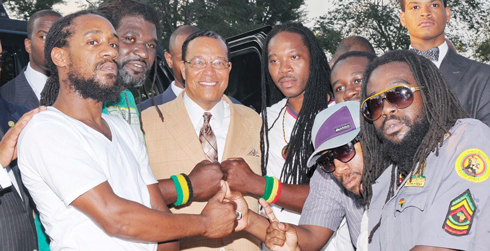
Min. Farrakhan is joined by Black men during visit to Chicago's South Shore community. Photo: dbarge.com
|
Advocates, activists share keys to proper development of Black men and boys
(FinalCall.com) - The portrayal of Black boys and men as thugs, criminals or perpetual underachievers is nothing new. And the unfortunate but glaring reality for Black males in the U.S. includes high unemployment, escalating prison rates and below average school graduation rates. Black men and boys are also members of a society that in many ways expects nothing more of them.
According to the Bureau of Labor Statistics, the unemployment rate for Black men age 20 and over is 14.9 percent, although in many areas the numbers are much higher. The Sentencing Project, which tracks incarceration and criminal justice issues, reports 1 out of 10 Black males in their 30s is in jail or prison each day in the U.S. The so-called “War on Drugs” is a war on Black men, according to many activists.
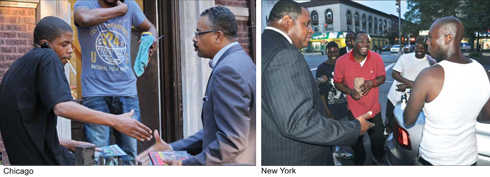
|
“If trends continue one out of every three Black males born today can expect to go to prison in their lifetime,” warned the Sentencing Project.
But despite a country that continues to view them as its problem, igniting and cultivating positive change in Black males is possible. With spiritual and practical effort, say teachers, activists and community leaders, Black boys and men can unlock their potential. In doing so, they can become a beacon of light for their communities, the nation and the world.
Spiritual direction needed
The key to unlocking the potential to Black men is self-knowledge and the knowledge of God, Ishmael R. Muhammad, the national student assistant to the Honorable Minister Louis Farrakhan told The Final Call.
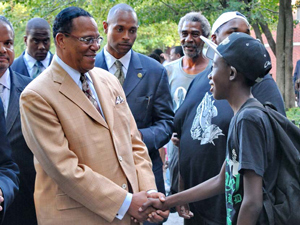
Min. Farrakhan’s ministry has included tireless work to
develop Black men. Photo: dbarge.com
|
“The most important thing is the demonstration of love and we’re going in the community and we are showing them that we love them, that we respect them,” said Student Min. Muhammad.
That knowledge along with a sincere heart has opened the community’s arms and hearts to receive the F.O.I., he added.
“What most of our young brothers lack is guidance in a real sense, in terms of male role models, positive images for them to latch onto,” said Imam Rashad Abdul-Rahman, the assistant imam of Masjid Sultan Muhammad in Milwaukee, Wisc.
This leads to a lack a belief and awareness of themselves, he added. “They don’t see themselves as producers, builders or men responsible for the uplift and upkeep of civilization,” said Imam Abdul-Rahman.
The Holy Qur’an, the book of scripture of the Muslims and the example of Prophet Muhammad gives men that responsibility right in their hands, he added.
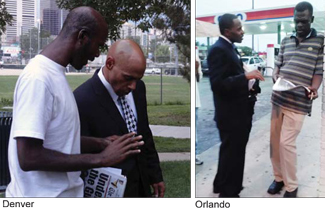
|
The Nation of Islam has a long history of developing Black men and as Min. Farrakhan went around the country meeting with Black men in the run-up to the historic Million Man March in 1995, he delivered messages especially for them.
Since the meetings were Men Only, the Minister explained that there was a need for the dealing with the challenges facing Black men. “It has never been in the Nation of Islam’s history to call a meeting to discriminate against women, for we know, as students of the Honorable Elijah Muhammad, he taught us that where there are no decent women, there are no decent men; and that no nation can rise any higher than its women, so we are not discriminatory against women,” said Min. Farrakhan, speaking January 24, 1994 to approximately 20,000 men about the principles of manhood at the 369th Armory in New York, N.Y.
“However, when we look at the condition of our community, it is not White women, or Black women, for that matter, who are filling the morgues of the cities of the United States; it is young Black men being killed by young Black men. Therefore, that tells any human being who loves his people that we have a problem in our community that can’t be solved by more police and more jails. The problem in the inner cities of America can only be solved by more justice, particularly to the man,” he said.
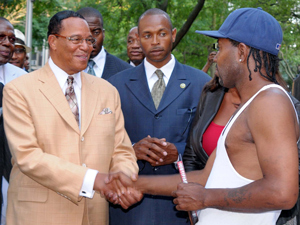
Black men shakes hands with Min. Farrakhan, who has lead Nation of Islam peacemaking efforts. Similar work is underway
across the country and in Canada, South Africa, England, and Trinidad. Photo: dbarge.com
|
“Our purpose is to discuss with men how God intends for a man to act; and then let us choose whether we want to act like the product of a slave past, or whether we want to act and become the product of God’s presence among us,” Min. Farrakhan continued.
“Before our talk is over, I want White America to see that genocide against Black people is not necessary. First of all, it can’t happen; and lastly, it is not in the best interest of this nation to kill Black men wholesale. Nor is it in our best interest for us to kill one another to the joy of those who have already destroyed us and our families.”
In addition to physical incarceration, the Minister pointed out the prison of ignorance “does not allow us to be the men that we know we are capable of being.”
“The Honorable Elijah Muhammad developed a methodology of bringing out of the Black man what God has put within, so that we could learn to respect ourselves and to respect one another. He refused to allow us as men, in the men’s class which is called the Fruit of Islam (F.O.I.), to ‘front each other off,’ even playing like we were going to fight one another, because he was teaching us that our flesh and blood are sacred,” he said.
Muslim men were taught to settle disputes non-violently with one another and to use their intelligence, instead of weapons, Min. Farrakhan added. “We have to make a pledge that we will not lift our hands to harm our brother or sister, and that we will suffer the insult of one another peacefully, and will not reach for a weapon to solve a problem between the members of the family,” he said.
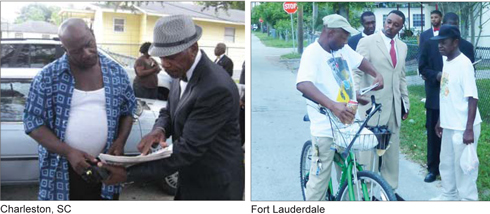
|
“This society is, and has been, destructive to the Black male. This is why it is necessary for us to come together, because the problem of our community is our problem. And unless we, as men, rise up to take our responsibility, then our women and girls and our children will have no reason to honor us and respect us as the head of our house and the head of our own community.”
Black men must be cultivated through a proper relationship with God to fulfill their purpose, Min. Farrakhan explained.
“ ‘Let us make a man in our image and after our likeness,’ means ‘Let us make a God—less than we, but he will have force and power, like God. And let us give him dominion; give him rule. Let’s give him power, so that he can exercise his will in his domain, like we exercise our will over the heavens and the earth,” said Min. Farrakhan.
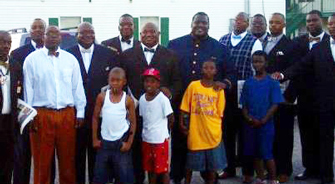
Greenville, MS
|
The Minister added: “But no man—please pay attention—is alive with just physical breath in his body. The only way we, as men, are considered alive is if God breathes into us the breath of his life. Only then we become a living man who has power; who is going to take dominion, and you’re going to become a producer. But if God doesn’t breathe into you, then you’re alive from the neck down, but dead from the neck up, so another man can put you to work to produce for him, and you never enjoy the fruit of your labor.”
Inspiration and targeted programs
“These young men cannot survive on inspiration alone,” said Attorney Malik Zulu Shabazz, chairman of the New Black Panther Party. “Mentoring time, programs that are regularly set up where they can attend and where they can spend time with other Black men who are positive is key.”
Organizations that have proven results such as the N.O.I., New Black Panther Party and others must not only work more closely with each other but also establish relationships with local social service agencies in the community, he said.
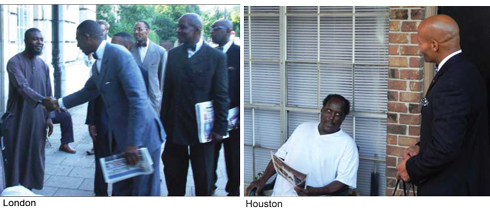
|
“And so there needs to be a better integration in what I call Black conscious organizations and community-based service organizations that many times have the resources and have their hands on the youth but don’t have again, the knowledge and the unique experience that we have in awakening the minds of our youth,” said Atty. Shabazz.
Nationwide many national and grassroots groups have the mission of mentoring, educating and elevating Black men and boys, 100 Black Men of America Inc. and several Black fraternal organizations, churches, foundations and celebrities.
Comedian, author and syndicated radio host Steve Harvey and author and businessman Tavis Smiley are among celebrities known for their work with young Black men.
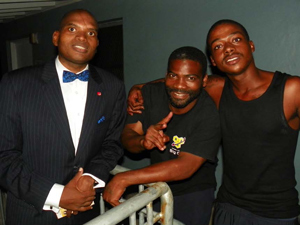
Miami
|
On average, only 47 percent of Black male’s graduate high school noted the Schott 50 State Report on Public Education and Black males.
Urban Preparatory Academy, an all-male public charter high school in Chicago, has gained national attention for its success in graduating its all Black student body. For the third straight year, its entire graduating class has been accepted to four-year colleges or universities. Such success is further proof investing in the education and cultural development of Black males leads to their success, say activists and advocates.
Phillip Jackson is executive director of The Black Star Project, a Chicago-based group that provides mentoring, tutoring and other resources to Black and Latino youth. The violence gripping Chicago this summer has seen Black men and boys as both victims and perpetrators.
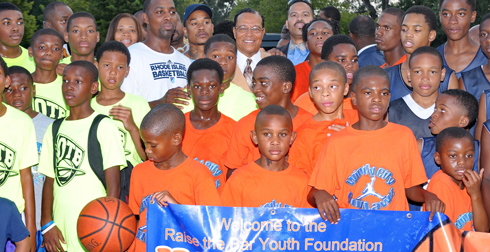
Young hoopsters welcomed Min. Farrakhan to their tournament as the Fruit of Islam mass mobilized increase peace on Chicago’s South Side. Development of Black males is a hallmark of the Nation of Islam. Photo: dbarge.com
|
“One of the things that was beaten out of our Black men, that was extracted from Black men, that was systematically removed from Black men is confidence,” said Mr. Jackson.
“We don’t believe in ourselves, and please understand, this was no accident. This was highly systematic conditioning creating a race of men who didn’t believe in themselves. That doesn’t mean that every Black man doesn’t believe in himself, I’m not saying that,” he explained. But, said Mr. Jackson, the lack of confidence and positive self-concepts is a pervasive problem.
A contributing factor to this lack of confidence is what Black boys are subjected to in public schools in terms of academic failure and overly harsh discipline, said Mr. Jackson. Lack of confidence leads to a lack of courage and commitment, he added.
Asked how these qualities can be cultivated in Black boys and men, Mr. Jackson stresses starting at an early age. “The way you do is, is you design systems and structures that build in these noble qualities. Right now, the systems and structures in the Black community for the most part are designed to reinforce the lack of those behaviors,” he argued.
Institutions must also be designed to create these values, added Mr. Jackson. Institutions must also be proactive in meeting young men where they are in order to uplift them, according to advocates.
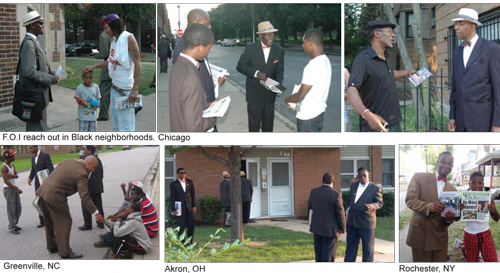
|
“I would say that the job that the Fruit of Islam are doing by leaving the mosque and going into the streets and engaging those young men on the streets and in the projects of America, just that in and of itself is going to have a major effect on the Black community as we move into the future,” said Atty. Shabazz.
“I encourage all organizations to follow suit because even though we don’t have large amounts of resources and city budgets, the care and the love and the compassion and the knowledge and the hand to hand on the ground service. Providing that in the community the way the Nation of Islam is doing right now, the F.O.I. and the M.G.T. and the New Black Panther Party, I see that as a big, big plus.”
Shaping boys into men
Lyle Muhammad has taught the Jr. F.O.I. class at the Nation of Islam’s Chicago headquarters for the past several years. He is serious about his role in encouraging and developing future husbands, fathers and positive contributors to society. The class meets every Saturday for nearly three hours and students range in age from five to 15. He agrees that working with Black boys at a young age is critical.
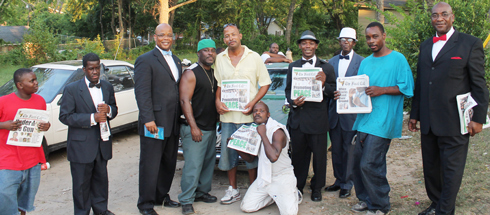
Macon, GA
|
“A lot of our young brothers don’t have positive male role models and to me it’s like, babies fashion themselves after the adults or older people that they have in their life so they’re watching them. They’re watching them to learn how to walk and talk and they begin to put into practice what they’re learning from bigger human beings so it’s very important that young men have a positive role model and I just strive to be that with them,” said Lyle Muhammad, a husband and father.
He offers the young men discipline through military drill exercises, self-defense and offers spiritual guidance, sharing real life fundamental lessons. He encourages the young men and boys to apply these lessons in their daily lives.
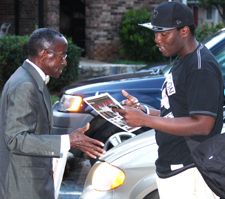
Atlanta Muslim shares Final Call newspaper and other information. Photo: Erick Muhammad
|
“I try to be as disciplined as possible myself and teach discipline to them to inspire them, motivate them to be something more than what they see in our community and just try to keep them focused on God and His example before us, the Honorable Minister Louis Farrakhan. I just try to keep stressing and teaching them basic fundamental principles of being a godly man,” Lyle Muhammad added.
He sympathizes with single mothers as his mother raised him and two brothers by herself. However, he said, mothers should “really strive not to baby” their sons. His mother made sure he and his brothers faced daily battles that presented themselves, said Mr. Muhammad.
“Some of the sisters are very protective when they see a man trying to participate. I mean you do have to be careful, but they’re so protective that they baby them. Little boys are going to be little boys. They’re going to run, fight, jump, fall, run into things, break things. You know, permit them to do that. Don’t try to shelter them from life. That’s what we are, we’re men and we tend to need that type of roughhouse life. I ask the sisters to permit me to do what I believe Allah desires for us to do as men,” he added.
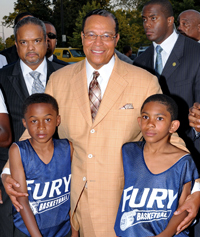
Min. Farrakhan with youth at basketball tournament Muslims
visited during outreach in Chicago. Photo: dbarge.com
The South Shore community has one of the highest violence rates
in Chicago. Min. Farrakhan led the Fruit of Islam into the streets
July 30 to greet residents and inspire efforts to defuse tension.
Photo: dbarge.com
|
“He said because you are charged with the responsibility of teaching our future. And so I look at it that way. He also said when you are a good example to young men, they grow up in love with you and they’ll talk about you to their children,” said Lyle Muhammad.
The challenges are many, but activists said dedication and commitment on a spiritual, economic and social level are keys to unlocking the minds of Black men.
“A lot of people want an easy fix to the problem of Black men. They just want it to be fixed because of a speech or because of a one night outing or something. That’s not going to fix it. You’ve got to do the work. That’s what the Honorable Elijah Muhammad was doing,” said Mr. Jackson. “You can’t win this battle that we’re talking about without having supports because people go into the world and if they have that internal discipline and those values that have been built into them from when they were very young, they will be able to weather the challenges of the world.”
INSIDE STORIES AND REVIEWS
-
-
About Harriett ... and the Negro Hollywood Road Show
By Rabiah Muhammad, Guest Columnist » Full Story -
Skepticism greets Jay-Z, NFL talk of inspiring change
By Bryan 18X Crawford and Richard B. Muhammad The Final Call Newspaper @TheFinalCall » Full Story -
The painful problem of Black girls and suicide
By Charlene Muhammad -National Correspondent- » Full Story -
Exploitation of Innocence - Report: Perceptions, policies hurting Black girls
By Charlene Muhammad -National Correspondent- » Full Story -
Big Ballin: Big ideas fuel a father’s Big Baller Brand and brash business sense
By Bryan Crawford -Contributing Writer- » Full Story






 Click Here Stay Connected!
Click Here Stay Connected!








